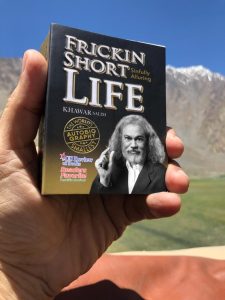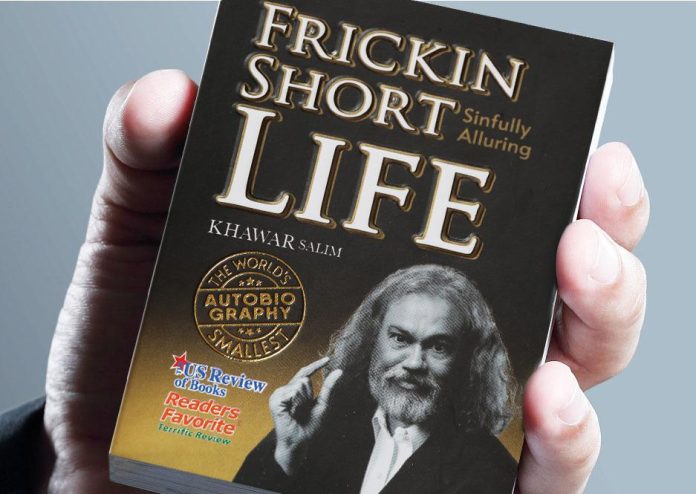What better way to review a book than to immerse the reader in the ambiance it creates? After all, our book selections are often driven by how we feel in that moment; often curious, determined, and liberated. That’s why, on some days, an avid reader would walk out of a bookstore empty-handed, and someone who never intended to buy a book finds themselves sold at first glimpse.
The competition here is less, with this biography being the only book review in this edition of Synergezer.
If it’s indeed the world’s smallest book, as of December 2022, be prepared for a journey where time slows down and unwinds with 268 concise chapters from Khawar Salim’s life for how he uses imagery as his dominant literary device, making the experience all the more immersive.
The book’s design is a reader’s delight, featuring no more than 50 words on each page, widely spaced text, intriguing pictures, and rich, golden pages marking the beginning of each chapter – a sweet spot for those with a short attention span. Beyond its aesthetic appeal, “Frickin Short Life” has a lot more to offer than fascinating romance and wanderlust.
“Hell yes, poverty suffocates your soul and stifles your desires. But if you fight back, you’ll rise above the difficulties and come out stronger and wiser.” – Khawar Salim
This book resonates with individuals facing some if not all of his struggles, from poverty and striving to make ends meet with torn clothes and unmended shoes to hunger child labour and his initial struggle with English, followed by anxiety, shame, and ulcers for that reason in the first few chapters. It delves into the hustle of college days, sacrifice, the sting of rejection, abandoning his passion for arts for decades, as well as heart-wrenching losses to the unfair reality of death, losing both his mother and sister to cancer.
The way we’re able to glide through pages in a matter of seconds is dopamine-enriching super rewarding for those with a busy routine or a short attention span. The satisfaction of finishing reading a book is undeniably gratifying. However, for some readers who choose to immerse themselves fully in the imagery Khawar creates with his words, the journey may be slower but equally rewarding as it prompts self-reflection.
The biography begins with a thought-provoking exploration of reincarnation, painting an abstract picture of existence before the soul inhabits a body and gains consciousness. The chapters dedicated to childhood are a delightful reminder of the fantasies we all had as children, regardless of their cost.
He might have some of you surprised with some of his inventions, a computer, a digital lock, and a transistor radio, to name a few. However, he provided more evidence to support his image as an artist and his time in the advertising industry.

“Art is the paint you applied around your thoughts.” – Khawar Salim
He had me at unfinished paintings. Who knows what would strike your attention that may be deeply personal to you.
Maybe yours could be salt, lime, and tequila, or where he says, “I kept wondering if trust and fidelity were more important in love or stupid conditions.” Or where he quoted Barry Day, stating, “Advertising is the most fun you can have with your clothes on.”
Khawar’s bittersweet relationship with the advertising world is both fascinating and paradoxical. If you’ve been in advertising enough to hate it like it’s some paranoid girlfriend, you’d get most of what this guy is trying to say. You may even feel between some chapters that there was more depth to some stories the author must have written but was reluctant to share; he likely excluded them from the manuscript like deleted scenes from a film.
He had his fair share of infatuations. However, his accounts of love might not resonate with everyone. To make your life easier, the chapter is nine if you’re curious to know. How he referenced figures like Adam to justify his changing interests is uncomfortably intriguing. And I’m going to say this without politicising it, but he also threw shade on women who are easy to impress.
His biography also teases your imagination from time to time, and you may even encounter a few surprising nude paintings. Some exotic travel stories from London, Dubai, Paris, LA, California, Berlin, Milano, Oslo, Prague, Marbella, Moscow, Istanbul, and Bangkok add an extra layer of allure to his biography.
If you’re not inherently courageous, some chapters may feel less relatable.
The way Khawar narrates his journey is deeply nostalgic, prompting readers to reflect on their own forgotten experiences and reconnect with personal memories. For some, it takes a quiet weekend; for some, a vacation that reminisces experiences from their past, and for some, a tragedy. Khawar paid a price too big for you to be able to read this. His paralysis was a hard time for his faith, but it’s better to hear it from him in his autobiography.

